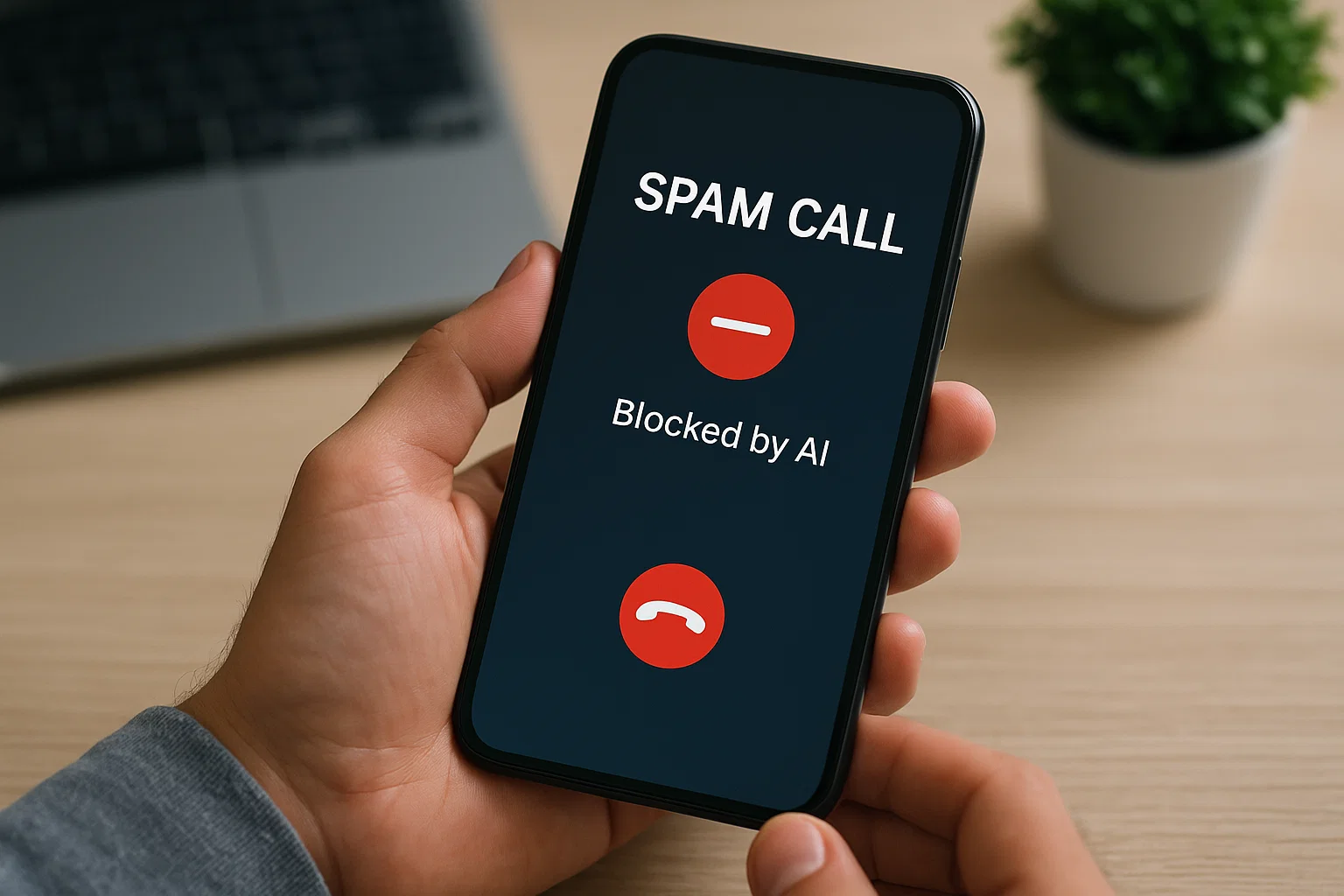The Modern Spam Call Problem
Your phone rings. Unknown number. Local area code. You answer—only to hear a robotic voice about your car’s extended warranty.
Sound familiar? You’re not alone. Spam calls remain one of the most frustrating problems for smartphone users. Millions of people are searching every month for answers to questions like:
-
Why am I getting so many spam calls?
-
How do I block spam calls on iPhone?
-
What happens if I answer a spam call?
This guide breaks down why these calls keep happening, how to stop them with the tools you already have, and why an AI-powered blocker like Heynet provides the most effective defense in 2025.
What Are Spam Calls (and Why You’re Getting Them)
Spam calls are unwanted, often automated calls designed to sell you something, collect your personal information, or trick you into a scam.
Top reasons your phone is targeted:
-
Data breaches: Your number was leaked or sold on a marketing list.
-
Auto-dialers: Cheap software blasts millions of numbers daily.
-
Neighbor spoofing: Scammers fake local numbers to increase the odds you’ll pick up.
-
Verification value: If you answer, your number is marked as “active” and targeted more often.
Fun fact: The term “spam” comes from a Monty Python sketch where the word was repeated endlessly—just like these calls flooding your phone.
The Risks: What Happens If You Answer
Many people ask: Is it dangerous to answer a spam call? The answer is yes.
When you pick up:
-
You confirm to scammers that your number is real.
-
You may be drawn into phishing attempts (fake IRS agents, bank fraud calls, or “tech support” scams).
-
You could fall victim to a “wangiri” scam—one-ring calls designed to get you to call back at premium rates.
Best advice: If you accidentally answer, hang up immediately. Never share personal or financial information.
How to Block Spam Calls on iPhone
Apple includes several tools to reduce spam calls:
Silence Unknown Callers
-
Go to Settings → Phone → Silence Unknown Callers.
-
Calls from numbers not in your contacts go directly to voicemail.
Block Specific Numbers
-
Open the Phone app → Recent Calls → Tap ⓘ → Block this Caller.
Carrier Tools (#662#)
-
Dial #662# to enable carrier-level spam blocking (works with AT&T, Verizon, T-Mobile).
-
Useful, but scammers often switch numbers faster than carriers update lists.
The limitation: These tools are static. They silence calls, but don’t stop new scams or spoofed numbers from reaching you.
How to Block Spam Calls on Android
Even though Heynet is iOS-only, Android users search for this daily. Here’s what’s available:
-
Google Call Screen (Pixel phones): Google Assistant answers unknown calls and shows you a transcript.
-
Samsung Smart Call: Identifies suspected spam numbers and lets you block them.
-
Carrier blocking (#662#): Same dial code as iPhone, with similar pros and cons.
The issue: Android solutions vary by brand and carrier. They reduce some calls, but leave gaps for spoofed or new scam numbers.
Why Built-In Blockers Aren’t Enough
While native settings and carrier tools help, they struggle with:
-
Constantly changing scam numbers.
-
Neighbor spoofing (calls from numbers that look like yours).
-
Balancing spam filtering without missing legitimate calls.
Most importantly: they don’t learn or adapt in real time.
The Heynet Advantage
Heynet’s AI spam blocker goes beyond static rules:
-
Real-time AI detection: Blocks new scams instantly, before your phone rings.
-
Adaptive learning: Improves with every blocked call and user report.
-
Community-powered protection: Shares intelligence across users for faster updates.
-
Custom allow/block lists: You decide who gets through and who doesn’t.
With Heynet, you don’t just silence spam—you stop it at the source.
The Top Spam Call Types in 2025
Spam calls follow predictable scripts. Knowing the most common ones makes it easier to spot a scam before you pick up.
Car Warranty Calls
Still one of the most notorious spam calls. You’ll hear a recording claiming your car’s extended warranty is about to expire and urging you to press a key or pay a fee.
Tech Support Scams
Scammers pretend to be from Microsoft, Apple, or another tech giant, warning you of a virus or account problem. Their goal: remote access to your device or fake “repair” fees.
IRS and Law Enforcement Impersonation
These calls threaten fines, lawsuits, or even arrest if you don’t pay immediately. Caller IDs are often spoofed to look like local police or government offices.
Medicare and Health Insurance Scams
Commonly targeting seniors, these calls promise free medical equipment, new cards, or special benefits in exchange for personal information.
Delivery and Package Scams
A caller claims to be from FedEx, UPS, or USPS, saying a delivery can’t be completed until you pay a fee or confirm personal details.
Charity and Disaster Relief Scams
Around holidays or after major events, scammers pose as charities seeking urgent donations. The money never reaches real relief efforts.
One-Ring or “Wangiri” Calls
The phone rings once and hangs up. If you call back, you’re routed to a premium-rate number that charges by the minute.
The Future of Spam Calls
Spam calls aren’t going away anytime soon. In fact, they’re evolving. Scammers are already experimenting with AI-generated voices that can mimic friends, family, or even law enforcement to make calls more convincing. Caller ID spoofing will continue to get smarter, making it harder to trust local-looking numbers. At the same time, regulations like STIR/SHAKEN help carriers block some robocalls, but these measures often lag behind new tactics. The future of spam calls will be shaped by a constant cat-and-mouse game between fraudsters and technology. That’s why adaptive, AI-driven blockers—tools that can learn from patterns in real time—are quickly becoming the only reliable defense.
FAQ—Frequently Asked Questions
Why do spam calls hang up?
Spam calls often hang up for one or more of these reasons:
-
To verify your number is active (if someone picks up, it’s a real number).
-
Because their auto-dialer doesn’t immediately connect you to a human.
-
They may be trying the “one-ring / wangiri” tactic—calling, hanging up, hoping you’ll call back a premium or international number.
Can spam calls hack your phone?
Short answer: not in the sense of malware or operating-system takeover just by answering. However:
-
If you engage (provide personal info, press numbers, grant remote access), you risk phishing, identity theft, or giving scammers tools to exploit you.
-
Emerging threats (like AI voice cloning) are making impersonation more realistic.
Should I answer unknown numbers?
It’s safer to let them go to voicemail. If the call is urgent, the caller will leave a clear message. Answering gives spammers confirmation your number works, which often increases the amount of spam you’ll get.
Take Back Control
Spam calls are more than a nuisance. They’re disruptive, risky, and increasingly sophisticated.
-
iPhone’s built-in settings help, but they’re limited.
-
Carrier tools like #662# add another layer, but don’t catch everything.
-
Heynet’s AI-powered blocker is the only proactive solution that adapts to new tactics in real time.
Download Heynet today on iOS and enjoy a phone that only rings for the people who matter.








